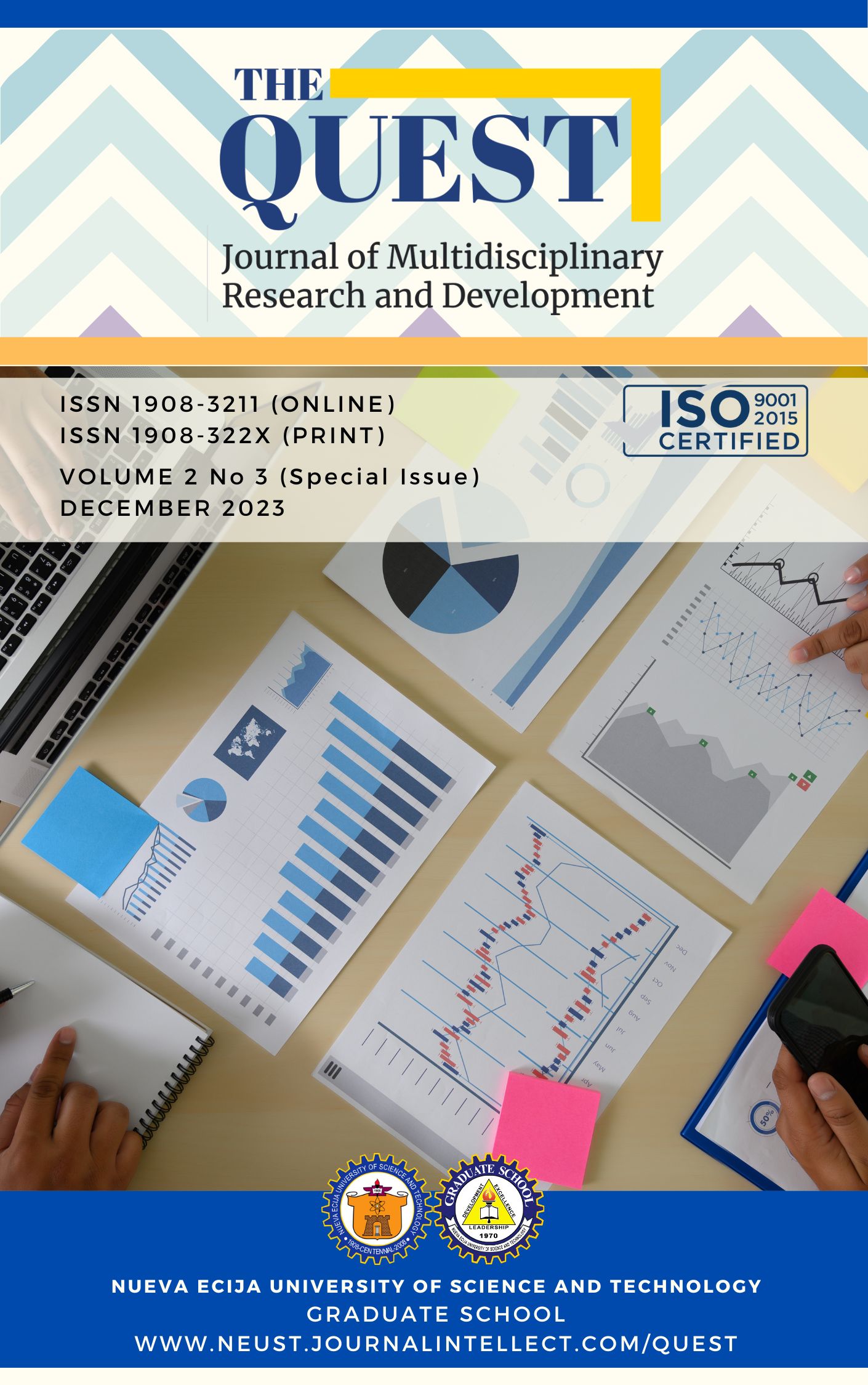Test Anxiety, Readiness, and Intervention Strategies for Enhancing Board Exam Performance among Psychology Students

Published 12/30/2023
Keywords
- Test Anxiety,
- Readiness,
- Intervention strategies,
- Academic Self Efficacy,
- Study Habit
How to Cite
Copyright (c) 2023 The QUEST: Journal of Multidisciplinary Research and Development

This work is licensed under a Creative Commons Attribution-NonCommercial 4.0 International License.
Abstract
Abstract. This descriptive correlational study examines the relationships between test anxiety, academic self-efficacy, and study habits among 31 fourth-year psychology students in a selected educational institution. Utilizing three instruments—the Test Anxiety Inventory by Charles D. Spielberger, the Academic Self-Efficacy Scale by Kunnathodi Abdul Gafoor, and a self-made Study Habit Questionnaire—the study employs a quantitative research design, analyzing numerical data without variable manipulation. Weighted mean calculations will determine average levels of test anxiety, academic self-efficacy, and study habits, providing verbal descriptions of the findings.
Pearson correlation analysis will explore relationships between test anxiety, academic self-efficacy, and study habits, revealing significant correlations, their direction, and strength. Linear regression analysis will investigate whether academic self-efficacy and study habits predict test anxiety levels.
The study reveals that anxiety, worry, and emotional distress related to high-stakes licensing exams present significant barriers to optimal performance among psychology students. While emphasizing content knowledge and exam readiness, evidence-based interventions targeting anxiety management and self-efficacy are essential. A two-pronged approach is recommended for psychology programs—focusing on both content mastery and anxiety regulation. Implementing multifaceted training protocols encompassing resilience, coping strategies, mentorship support, and efficacy-building exercises holds potential to enhance outcomes in board licensing exams. A comprehensive training strategy addressing content knowledge and anxiety regulation skills equips students to maximize performance on board licensure examinations.
Keywords: Test Anxiety; Readiness; Intervention Strategies; Academic Self-Efficacy; Study Habit
References
- Buch, R., Vyas, S., & Moitra, M. (2019). Documenting factors related to examination stress among school children in Surat city. International Journal Of Community Medicine And Public Health. https://doi.org/10.18203/2394-6040.IJCMPH20191423.
- Dan, O., Ilan, O., & Kurman, J. (2014). Attachment, self-esteem and test anxiety in adolescence and early adulthood. Educational Psychology, 34, 659 - 673. https://doi.org/10.1080/01443410.2013.814191.
- Goda, Y., Yamada, M., Kato, H., Matsuda, T., Saito, Y., & Miyagawa, H. (2015). Procrastination and other learning behavioral types in e-learning and their relationship with learning outcomes. Learning and Individual Differences, 37, 72-80.
- Huntley, C., Young, B., Smith, C., & Fisher, P. (2023). Metacognitive beliefs predict test anxiety and examination performance. Frontiers in Education. https://doi.org/10.3389/feduc.2023.1051304.
- Keleş, T., & Yazgan, Y. (2022). Indicators of gifted students’ strategic flexibility in non-routine problem solving. International Journal of Mathematical Education in Science and Technology, 53, 2797 - 2818. https://doi.org/10.1080/0020739X.2022.2105760.-
- Lone., R. (2021). Study Habits and Academic Performance among Students: A Systematic Review. RESEARCH REVIEW International Journal of Multidisciplinary. https://doi.org/10.31305/rrijm.2021.v06.i05.019.
- Lotz, C., & Sparfeldt, J. (2017). Does test anxiety increase as the exam draws near? – Students' state test anxiety recorded over the course of one semester. Personality and Individual Differences, 104, 397-400. https://doi.org/10.1016/J.PAID.2016.08.032.
- Octavianti, S., & Usman, O. (2019). Effect of Environmental School, Study Habits, Interests Learn, Learn the Readiness of Students. Humanities eJournal. https://doi.org/10.2139/ssrn.3415344.
- Ringeisen, T., Lichtenfeld, S., Becker, S., & Minkley, N. (2018). Stress experience and performance during an oral exam: the role of self-efficacy, threat appraisals, anxiety, and cortisol. Anxiety, Stress, & Coping, 32, 50 - 66. https://doi.org/10.1080/10615806.2018.1528528.
- Taheri-Kharameh, Z. (2017). 8: ACADEMIC SELF-EFFICACY AND TEST ANXIETY AMONG STUDENTS OF MEDICAL SCIENCES. BMJ Open, 7. https://doi.org/10.1136/bmjopen-2016-015415.8.
- Valcheva, M., Rangelova, R., & Dimitrova, Ð. (2016). Overload during exam session: a factor influencing the levels of stress among students. Varna Medical Forum.
